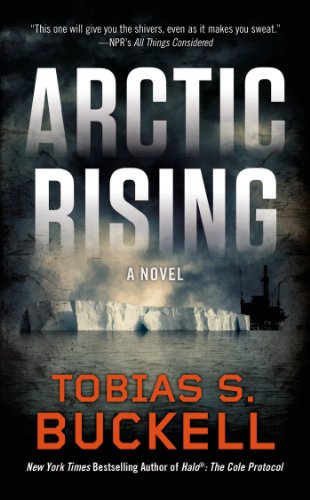
![]() Arctic Rising by Tobias Buckell
Arctic Rising by Tobias Buckell
Tobias Buckell offers up a fast-paced near-future technothriller in his latest novel, Arctic Rising. Two strong main characters, an intriguing and just-detailed-enough future setting, and crisp, clear prose make it mostly a winner, with only a few flaws to spoil the fun.
Arctic Rising takes place roughly 50 years from now, by which time global warming has freed up most of the northern ocean, meaning the long-sought Northwest Passage is finally open for business. Which is good, as the lack of sea ice has also begun a boom in oil and other resource mining in the “Arctic Tiger” countries (Greenland can’t mine the stuff fast enough and has to import guest workers), which include the big players (Canada, the U.S. Russia, China), some consortiums of small players (the Caribbean islands for instance), and an autonomous enclave called Thule made up of a hodgepodge of differently-governed demesnes, including one with an official “benevolent dictator.”
The northern region is the 21st century’s Wild West, but a lot less simple than in the Westerns. There are a host of players here, and the good guys and bad guys (not to mention the sundry grey guys) are a lot harder to tell apart and a lot more varied. For one, they’re not all guys, not even close. And they’re just as likely to sport dreads as black or white hats, hailing from a range of nations and quasi-nations.
Our main character, Anika Duncan, is originally from Nigeria, and has taken a job as an airship pilot for the UN, monitoring the northern waters and especially keeping an eye out for illegal dumping. Her attempt to pull over a suspicious ship goes quickly awry early on, and soon she is on the run — trying to avoid getting killed or arrested by a variety of adversaries, moving in and out of the embrace of a variety of allies (none of whom she is sure she can trust), and trying to solve the case that started the whole thing, which may or may not involve a stray nuclear missile and may or may not result in another World War or just possibly the end of the world as we know it.
Her possible allies include a local drug dealer (though that doesn’t do her justice) named Violet who seems to have a thing for Anika (Anika isn’t quite sure if it’s reciprocal) and a freelance spy named Roo whose island home sank beneath the rising sea waters. Her possible adversaries include a ruthlessly methodical yet sorrowful agent whose employers are never quite clear.
One of the pluses is that these characters aren’t the run-of-the-mill types; in a shrinking world it’s nice to see other nations and nationalities take some of the stage. Their differing backgrounds also offer up an unusual perspective on the Great Game of the 20th and 21st Centuries. At times this threatens to turn into speechifying or call too much overt attention to itself (such as a scene drawing attention to Anika’s sexuality which seemed way too forced), but these moments are rare and are more than outweighed by the positive impact of such diversity on story and character.
Specifically, Anika is a strong, determined character who simply refuses to bow out of the game no matter how many chances she gets to do so. And thanks to her background — both official and unofficial — her ability to manage events never feels implausible, as can happen at times when the ordinary person is thrust into action situations. (Violet on the other hand is a little less plausible, but not horribly so.) I actually liked Roo even better, with his relatively calm demeanor and conflicted reaction to events. Gabriel, the mysterious agent, is also painted in shades rather than broad strokes, taking on a much more intriguing role than generic bad cop.
The setting is quickly and economically conveyed, though it doesn’t lack for interest despite the relative brevity of description. Buckell leaves you wanting more: more on Thule, more on the Arctic change over time, more on what is happening with the superpowers and not-so-superpowers, more on what is happening down at the southern pole. The book has more than sufficient detail about this world; you don’t want more because the novel is lacking what it needs — you want more because it’s all so interesting and so well presented.
The action for the vast majority of Arctic Rising is fluidly and plausibly handled, especially in the first half, with a good sense of pace and sharp moments of sudden violence and longer periods of tension nicely broken up with quieter scenes of simple dialog between two or three of the characters. One reason for the fluidity is the sharp, clear prose throughout. The action spirals ever upward into higher and higher stakes the more Anika pursues things, finally reaching the aforementioned end-of-the-world scenario, which is an effectively compelling structure. The novel is weakest in its last 50 pages or so; the action feels less smoothly presented, less plausible, less clear. A few characters that appear at the end are a bit abruptly released onto the plot, and what eventually comes together doesn’t feel as well integrated as earlier plot points. A running subplot of possible romance between Anika and Violet also never felt real to me.
But despite some minor disappointment toward the end, and while I can’t say it pulled me too deeply in, Arctic Rising was an enjoyably quick read (I read it in a single sitting) that betters my (admittedly limited) past experience with the technothriller genre, thanks to the way it handles its topical themes of environmentalism, globalism, near-future economics, and Great Game politics and also thanks to its diverse cast. Recommended.





Trackbacks/Pingbacks